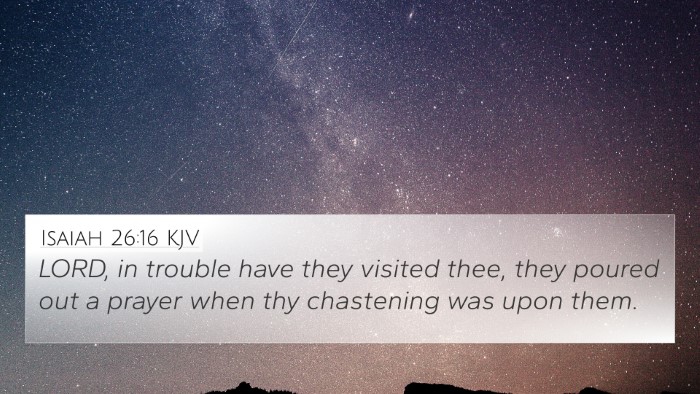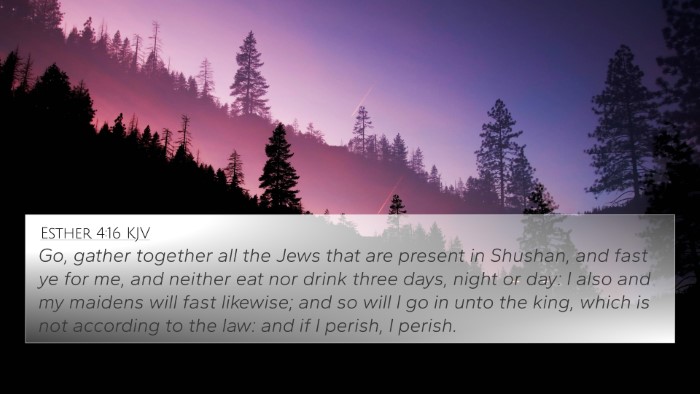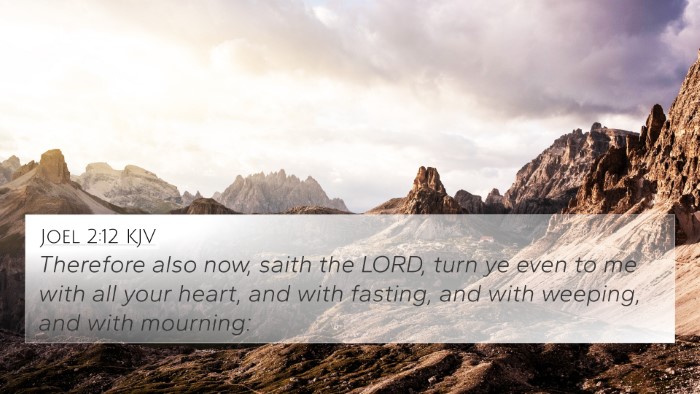Understanding 2 Samuel 12:16
Bible Verse: 2 Samuel 12:16 - "David therefore besought God for the child; and David fasted, and went in, and lay all night upon the earth."
This verse captures a poignant moment in King David's life, illustrating his deep sorrow and desperation after receiving Nathan's prophecy regarding the impending death of his child born to Bathsheba. The verse is rich in meaning and significance, deserving of careful analysis and cross-referencing with other key biblical texts.
Key Themes
- Desperation and Prayer: David's act of fasting and lying on the ground shows the depth of his supplication and reliance on God.
- Child's Illness: This situation underlines the human experience of grief and the pain associated with illness and loss.
- God's Sovereignty: This verse touches on themes of divine judgment and mercy amidst human struggles.
Commentary Insights
Matthew Henry's Commentary: Henry emphasizes David’s heartfelt desperation, reflecting on how true repentance and sincere prayer can lead to a deep personal engagement with God. David’s posture signifies humility and earnestness in seeking God’s mercy, underscoring that sincere prayer is often accompanied by a physical manifestation of grief.
Albert Barnes' Notes: Barnes elaborates on the cultural practices regarding mourning and fasting that would have been contextual for David. He notes that lying on the ground in prayer is an expression of profound grief and implores readers to understand the seriousness of David's situation, highlighting the emotional turmoil that accompanies such loss.
Adam Clarke's Commentary: Clarke points out the theological implications of David’s actions. He considers David’s response not just a personal loss but as a national concern, reflecting God’s covenant relationship with Israel. David’s petitions signify an understanding of God's mercy and justice, portraying a king who intercedes for his family with deep conviction.
Bible Cross References
- Psalm 51:10-12: A reflection of David’s repentance and plea for restoration, emphasizing the theme of seeking God’s mercy.
- Matthew 5:4: Blessed are those who mourn, for they shall be comforted, connecting grief with divine comfort.
- James 5:16: The effective prayer of a righteous man can accomplish much, reinforcing the power of earnest prayer.
- 2 Samuel 11:27: The account of Bathsheba’s pregnancy, illustrating the consequences of sin and David’s role in them.
- Isaiah 53:5: Foretelling the suffering Servant and the theme of bearing the anguish and affliction.
- 1 Chronicles 22:12: David’s aspirations for Solomon reflect his enduring concern for his family and the nation.
- 2 Chronicles 33:12-13: Manasseh’s prayer of repentance shows how profound grief can lead to sincere cries for mercy.
Linking Bible Scriptures
The narrative found in 2 Samuel 12:16 serves as a foundation for understanding numerous biblical themes and experiences:
- Connections to prayer and intercession can be found in Exodus 32:11-14, where Moses pleads with God for the Israelites.
- The deep expressions of mourning and their significance in relationships with God and others are mirrored in Job 1:20-21, where Job mourns his losses.
- David's reliance on God's character and mercy when pleading for his child's life resonates with Psalm 30:5, where we learn about God's anger enduring for a moment but His favor for a lifetime.
- The acknowledgment of God’s power in life decisions links with Proverbs 16:9, emphasizing God’s overarching sovereignty.
- Understanding the impact of sin and its consequences relates to Romans 6:23, where the wages of sin are underscored.
Additional Reflections
Thematic Bible Verse Connections: This account serves not only as a historical narrative but as a theological reflection on mourning, repentance, and the hope of divine mercy. It elicits the exploration of interconnected texts, enriching our understanding of God’s dealings with humanity.
To further deepen comprehension, readers can consider cross-referencing Biblical texts through various tools available, such as a bible concordance or a bible cross-reference guide. Such resources can enhance one’s study, allowing for an enriched experience of God’s word.
This verse and its context reveal how crucial it is to engage with Scripture dynamically, understanding that comprehensive Bible cross-reference materials can unlock deeper insights into prayer, supplication, and the heart of God towards humanity.
Conclusion
In summary, 2 Samuel 12:16 captures a moment founded in grief, humility, and the earnest seeking of God. The layers of meaning throughout derived from public domain commentaries above provide a wealth of insight into the importance of this passage within the greater narrative of the Bible. Engaging with biblical texts through the lenses of cross-referencing encourages a holistic understanding, enabling believers and readers to grasp the depths of scriptural teachings and their significance for life today.














